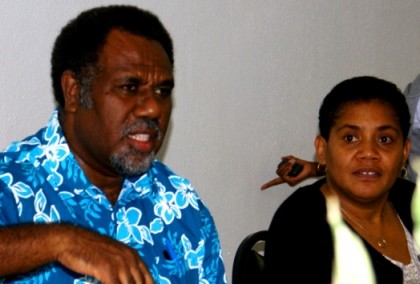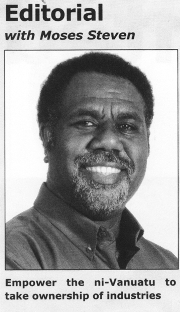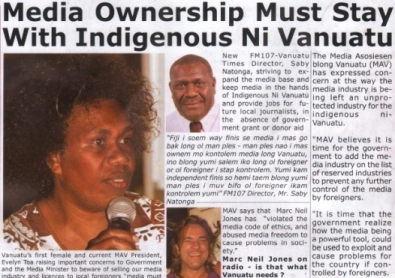
Media personalities in Vanuatu are in the throes of an intense debate over the right of a naturalised citizen to obtain a broadcasting licence.
Rivalry between Vanuatu media figures has come to a head with a slanging match between the Vanuatu Times and the Vanuatu Daily Post.
The disagreement is based around Vanuatu Daily Post publisher Marc Neil-Jones’ recent application for a broadcasting licence with the Vanuatu Broadcasting and Television Corporation (VBTC).
The Media Asosiesen blong Vanuatu (MAV) opposed the application on the grounds that the media industry should be included in the reserve list of operations that are restricted to indigenous ni-Vanuatu.
Neil Jones’ argument is that he has never tried to restrict anyone else from participating and operating in the media industry and has been living in Vanuatu for 21 years, including 17 of them publishing a newspaper.
'Same treatment'
“I have been a Vanuatu passport holder and citizen for the last 7 years, married to an Ambae girl and looking after four boys,” said Neil-Jones.
“I am entitled to the same treatment and benefits as any indigenous ni-Vanuatu, as are all citizens.”
However, MAV president Evelyn Toa fears that the indigenous people are being disadvantaged as foreigners have been allowed to invest in Vanuatu.
In a Vanuatu Times article during the week, Toa is quoted as saying, “foreigners have been allowed to invest and compete in those industries that the ni-Vanuatu are already investing in".
She then went on to accuse Neil-Jones (pictured) of using the indigenous people.
“This is what Neil-Jones has been taking advantage of over the past years and has become a grave concern for the indigenous ni-Vanuatu media practitioners,” she said.
The article accused Neil-Jones of being “a salesman by trade” and said that he “has violated the media code of ethics and abused media freedom by using his newspaper to cause problems in society".
Saby Natonga is the director of the Vanuatu Times and also the radio station FM107. He was quoted in the Times article as saying that the VBTC had a conflict of interest when opening up the industry to non-indigenous operators.
“Vanuatu market is small and what VBTC is doing is opening this to foreigners while enjoying the benefits of millions of vatus from government in grant and donor aid,” he said.
He also went on to attack Neil-Jones.
“A foreigner is a foreigner. Citizenship through naturalisation doesn’t make you an indigenous ni-Vanuatu because inside, you are still the same and you have the same mentality,” he said.
Neil-Jones was offended by the comments and penned an open letter to the editor of the Times. When the Times refused to publish the letter, Neil-Jones accused the the paper of breaching media ethics.
'Breach of media ethics'
Those sentiments were supported on the website of the Pacific Freedom Forum (PFF), a media freedom organisation based in the Cook Islands, of which Neil-Jones is a member.
The PFF expressed its concern, calling the refusal of the Vanuatu Times to publish Neil-Jones’ letter an “alarming breach of media ethics".
Chair of the PFF Susuve Laumaea , of Papua New Guinea, said: “Refusing anyone the right of reply to a news story where they are discussed and have their images published raises alarming concerns over professional standards and media ethics.”
The PFF article claimed that Neil-Jones' opponents were deliberately acting against him: “Noting what’s happened in Fiji as a positive move, they want to shut out anyone who isn’t ni-Vanuatu from the media industry.”
However, in an anonymous email from FM107, the reply came that Neil-Jones had breached media ethics himself.
“Marc's first right of reply had raving accusations about the MAV president and the Police Commission to justify his case which would have gotten him into more trouble if printed as accusation personal and unproved,” it said.
“We want indigenous ni-Vanuatu to own and run their own industries. Media for all, yes, but ownership kept to indigenous that understand the culture and lifestyle of the local people. We want our own identity.
“Marc has no respect and such so-called journalism got him into a deportation case.”
The blunt email was referring to early 2001 when Neil-Jones was unlawfully deported from Vanuatu before being able to publish an article critical of the government.
More recently, in January 2009, Neil-Jones was physically assaulted at his home following an editorial he wrote on the Director of Correctional Services. He had blamed the Director for prison escapes and the burning down of the prison.
The current dispute is complicated by the fact that journalists and broadcasters in Vanuatu belong to rival media freedom organisations. Neil-Jones is aligned to the Pacific Freedom Forum which has supported his case, while his opponents at the Times are aligned with the local MAV and also the Suva-based regional Pacific Islands News Association (PINA).
In fact, the current president of PINA is ni-Vanuatu Moses Stevens, who writes for the Vanuatu Times. Both Stevens and PINA have come under heavy criticism, not just from Neil-Jones, since their decision to remain in Fiji and engage in dialogue with the military regime.
Ni-Vanuatu 'marginalised'
Stevens has defended PINA’s stance, saying that it is the Melanesian way, and that it is pointless to try to "shout-down" a military regime.
However, Pacific media personnel have resigned from PINA, most notably vice-president John Woods from the Cook Islands News. PINA’s stance was also a factor in the recent decision to form a new media body in the Pacific, the Pasifika Media Association, or PasiMA, which is based in Apia, Samoa.
Stevens wrote on the licence issue in the Vanuatu Times this week. In his editorial, Stevens said: “We have heard claims of racism against foreigners; but in actual fact the ni-Vanuatu are being marginalised in many respects.”
“Vanuatu depends heavily on donors to develop its economy. And it is sad to acknowledge that in most cases a foreigner would stand a better chance to acquire funding from donors.”
But Neil-Jones believes the concerns are not valid and are based simply on rivalry.
He said that the radio station would be locally owned and would employ local people as his newspaper currently does.
“If we are given a radio licence it will be 100 percent locally owned and operated and be professional and well run, giving the public another station to choose to listen to if they wish,” he said.
“We have a track record with the newspaper for not supporting any political party and already employ 45 staff at Daily Post. Any new radio station will be localised and staff have training when required.”
Arguable call
Stevens wrote: “We understand, this is an arguable call, but the indigenous population of Vanuatu should be supported and empowered by their government in the industries that they have shown they can master.”
In another Times article, Member of Parliament for Port Vila, Patrick Crowby Manarewo, said that all applications for a business licence in the media industry should be strictly scrutinised by the government before a decision is made on granting the permit to operate.
"The media is a powerful weapon that can either build or destroy a society, or a nation like Vanuatu,” he said.
“The government has the duty and responsibility to scrutinise all applications for radio or television licence, to ensure that the operation of such a service would be for the betterment of the country.
"It is equally important that those granted a licence to operate in the media industry have a very good understanding and highly respect the cultures of our country."
But Neil Jones accused the Times of “playing politics.”
“Patrick Crowby…is a Port Vila MP who is close to Natonga,” he said.
“So once again you have the Times playing politics and having a conflict of interest as they are only interviewing and getting comments from their own political base.”
MAV responded to Neil-Jones in an email, telling him that he had breached media ethics first, by refusing to publish press releases from MAV and PINA.
“MAV does have records of articles or responses to articles in Daily Post that were banned from publication. Even e-mail messages from you (Marc) stating you will ban articles.”
MAV also issued a press release saying that indigenous interests in Vanuatu came before respect for diversity.
“Inter-cultural dialogue and respect for diversity are essential in our community but above this the interest of our indigenous respect for custom must be protected for the benefit of our future generation.”
Although the government is yet to make a decision, PFF’s Laumea is hopeful that they will grant the licence to Neil-Jones.
"PFF trusts the Vanuatu government would maintain the provisions of the mama law, or Vanuatu's own constitution which guarantees equality for all citizens, and freedom of expression," she said.



